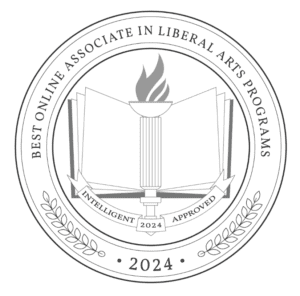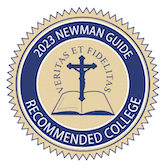Program Goals
- Exhibit an understanding of the central teachings in the Catechism of the Catholic Church in relation to the common good of human society, the dignity and transcendence of the human person, and principles of moral living.
- Demonstrate a fundamental knowledge of the Old and New Testament Scriptures in light of Catholic teachings.
- Exhibit a capacity to explain and apply the relationship between faith and reason.
- Exhibit an understanding of key concepts in Church history and their effect on human culture and civilization.
Program Requirements
- 60 Credits (24 Theology Credits, 33 General Education Core Credits and 3 Elective Credits)
Program Time Limit: 4 years
Application Process
- Submit a free program application and one letter of recommendation from church, employer, teacher, or counselor to registrar@cdu.edu.
- Submit evidence of high school completion/GED to registrar@cdu.edu.
- Students who have completed some college should also have official college transcripts submitted directly from those institutions.
Transfer Credit
Transfer Credit: Up to 30 credits (of which a maximum of 6 may be undergraduate theology credits) earned with a minimum grade of 2.0 from an institution(s) accredited by an agency recognized by the U.S. Department of Education or whose courses are endorsed by an accrediting body recognized by the U.S. Department of Education may be transferred, provided that these credits meet the requirements of the program. In exceptional cases, applicants may request special review of additional credits by Academic Leadership. Acceptance of transfer credits is at the discretion of Academic Leadership, who determines if transfer credits align with CDU’s AA curriculum.
A maximum combination of up to 15 credits from CLEP, Advanced Placement, DANTES and/or International Baccalaureate may be accepted. These credits count against the maximum total number of allowable transfer credits. For more information, see the Credit by Exam Policy.
Transfer of Theology Credit: A maximum of six undergraduate theology credits can be transferred in. Transfer credit must have been earned no more than five years prior to transfer and grade must be at least a 2.0 and submitted via an official transcript to be evaluated for transfer. Acceptance of transfer credit is at the discretion of Academic Leadership who determines if transfer credits align with the CDU AA curriculum.
Program Costs
- Tuition: $1,035 x 11 courses = $11,385
- Technology fee: $165/course x 11 courses = $1,815
- Books: $100/course (est) x 11 courses = $1,100
- Total: $14,300, *This total does not include the 9 required General Education courses that may be fulfilled with transfer credit
-
- Detailed cost of attendance budgets can be found here.
Course Preview
“CDU gave me a chance to study theology online in a way that would be easy for me as a working young adult. CDU gave me a chance to pursue something that has completely set my heart on fire—working with young people to show them the beauty of having a relationship with Jesus. I can’t wait to use the tools that I have gained from CDU to accomplish what Christ is calling me to.”
—Mary Kate Budd, AA in Liberal Arts
*We value your privacy. By submitting this form, you agree to receive emails, texts, and calls from Catholic Distance University (CDU). You may withdraw your consent at any time.
Course Lists
For descriptions of both required and elective courses, please consult the online course catalog. All courses listed below are 8 weeks long.
| Course Number | Course Title | Credits |
| SCRPT 103 | Survey of the Old Testament | 3 |
| SCRPT 106 | Survey of the New Testament | 3 |
| THEO 101 | Catechism of the Catholic Church, Part I | 3 |
| THEO 102 | Catechism of the Catholic Church, Part II | 3 |
| THEO 103 | The Moral Life: Living the Virtues | 3 |
| Theology electives | 9 |
In addition to the 33 credits in the Catholic Studies Core, students are required to earn 27 credits in the following areas. Courses are 8 weeks long unless otherwise noted.
General education courses ensure that students cultivate the skills, knowledge, and habits of mind that are essential in every field of study. To learn more, view the General Education Outcomes.
| English Language Arts | 3 credits |
| Natural Sciences (i.e., biology, chemistry, physics, geology) |
3 credits |
| Mathematics/Computer Science (i.e., mathematics, statistics, computer usage) |
3 credits |
| Classical or Modern Languages | 3 credits |
| Humanities/Social Sciences (i.e., history, sociology, economics, political science, art, music, scripture, theology.) Additional scripture or theology courses not used for the major may be taken at CDU. |
12 credits |
| Philosophy | 6 credits |
| Electives | 3 credits |
To see all of the general education courses offered, please see the General Education Course List.
The general education credits must be at the 100 level or higher and one must have received a grade of C or higher from an accredited institution. Experiential credit cannot be used in place of academic credit.
General Education requirements may also be fulfilled via the College Board’s Advanced Placement (AP) program and College-Level Examination Program (CLEP) and the Defense Activity for Non-Traditional Education Support (DANTES) Subject standardized Testing (DSST).
Year 1
Fall I
ENG 105. Introduction to Composition for Theology
HIST 201. Ancient Civilization
Fall II
THEO 101. Catechism of the Catholic Church, Part 1
CHIST 214. Church History I
Spring I
SCRPT 103. Survey of the Old Testament
MATH 105. General Mathematics for Liberal Studies
Spring II
THEO 102. Catechism of the Catholic Church, Part 2
CHIST 224. Church History II
Summer
BIO 101. General Biology
LATIN 101. Latin I
Year 2
Fall I
PHIL 205. Introduction to Philosophy with Plato and Aristotle
LATIN 201. Latin II
Fall II
PHIL 235. Elements of the Philosophy of the Human Person
HUM 260/THEO 290. Theology of Sacred Architecture
Spring I
SCRPT 106. Survey of the New Testament
HIST 211. Christian Civilization
Spring II
ENG 111. Introduction to Literature
THEO 213. God, Man, and the Universe
Summer
THEO 103. The Moral Life: Living the Virtues
THEO 232. Jesus Christ: God, Man, Savior
THE CDU ADVANTAGE
In a 2022 survey of CDU graduate students, 100% reported that they had achieved their learning goals.
CDU Offers:
- Authentic Catholic teaching
- Flexibility to study where and when you choose
- The lowest undergraduate tuition of any U.S.-based online university offering Catholic theology
- A global Catholic community
- Knowledgeable and accessible faculty
- Engaging online courses with discussion forums
- Mobile app for study on the go
- Online library staffed by a theological librarian
- 24/7 technical support

The AA program is nationally accredited by the Distance Education Accrediting Commission (DEAC), which is recognized as a national accrediting agency by the U.S. Department of Education and is a recognized member of the Council for Higher Education Accreditation. The university is certified as a degree-granting institution by the West Virginia Higher Education Policy Commission.





